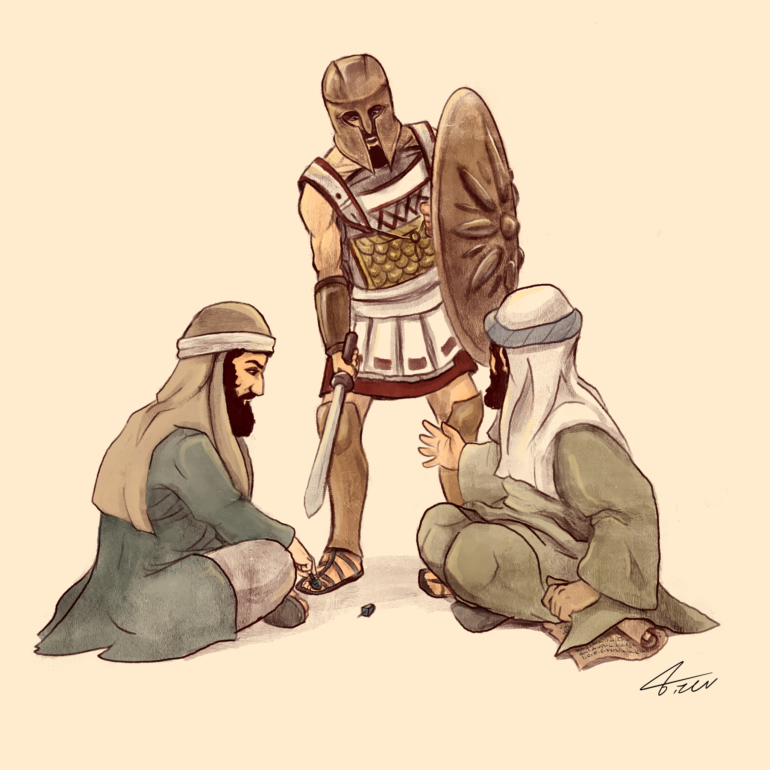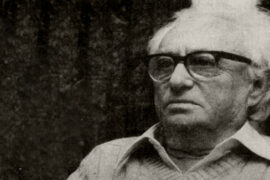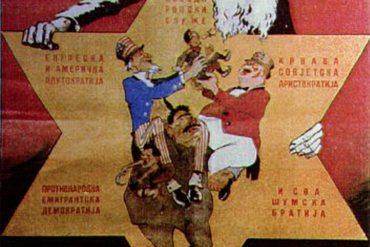The second chapter of a podcast series on the first Book of Maccabees.
For more content from VISION Magazine, subscribe to our newsletter and follow us on Twitter @VISION_Mag_, Facebook and YouTube. If you haven’t already, don’t forget to subscribe to our podcast on SoundCloud, iTunes, Stitcher, TuneIn, or Spotify and leave a rating and review to help us get our message out to a wider audience!
To support the podcast, head over to our PayPal portal and be sure to write a note that your contribution is for the podcast.
Hosted by: Robert Goodman
Transcript:
Shalom Aleikhem! And welcome back to Sefer Maccabim!
Now we mentioned in chapter one that because the Greek tyranny in Yerushalayim became so unbearable, virtually all the Jewish residents fled the city and took refuge in other nearby towns and villages. Among these Yerushalmi refugees was a kohen named Matityahu ben Yoḥanan, the son of the last legitimate Kohen Gadol, and his five sons, who (in descending age order) are named Yoḥanan HaKadshi, Shimon HaTasi, Yehuda HaMaccabi, Elazar HaḤorni and Yehonatan HaAphsi.
They lived in a village named Modiin, located at the edge of the Sharon plain in the foot of the Judean hills, roughly fifteen miles north-west of Yerushalayim. By virtue of being a kohen, Matityahu used to spend a lot of time in Yerushalayim serving in the Beit HaMikdash, but now he is forced to return to Modiin and live there with his family full time. Matityahu is the elder of the village, a highly respected man among his fellow Jews, and feels dreadfully the afflictions of his people.
The text describes how he cries out in anguished mourning:
“אוי לי כי נולדתי לחזות את שבר עמי וקריה הקדושה בידי בני נכר”
“Woe is me! For what reason was I born to see this misery of my people, and of the holy city, and to dwell there, when it was delivered into the hand of the enemy, and the sanctuary into the hands of strangers?” (Maccabees I 2:6)
Matityahu and his sons tear their clothes and don sackcloth, and they mourn greatly. But they won’t remain like this for long. Remember how we also mentioned in chapter one that the Greeks were circulating the whole of Judea to enforce their policy of mass Hellenization, and even the smallest hamlet in Judea was not safe from them? Well Modiin was no exception. Before we learn how the Greeks arrived in Modiin and were confronted by Matityahu, we have to tell over a story which is not related in the Book of Maccabees itself but has been passed down as part of our tradition.
The five sons of Matityahu had a sister named Miriam (or according to one version of the story she was their sister-in-law to be by virtue of being engaged to Elazar). In any case, she was getting married, and you’ll remember that as part of their decrees the Greeks enforced the prima nocta laws which gave the local Greek general first rights to the Judean bride before being intimate with her husband.
The nation had slowly become used to the decrees and the rabbis of the time were more focused on finding halakhic justification for the marriages rather than attacking the root of the problem, which would have meant open war on the most powerful empires of the time.
At her wedding feast, Miriam gets up and begins to strip down in public, much to the anger of the Ḥashmonai family. Miriam then scolds them, saying, “instead of directing your anger at me, attack the root of the problem, the Greek occupation that implements these laws!”
The brothers stop and realized, “yep, she’s right,” and immediately set about preparing for the armed struggle against Seleucid rule. So we see another example of the famous teaching “each generation is redeemed on account of its righteous women” (G’mara Sotah 11b). So when the Greeks arrive in Modiin, Matityahu and his sons are ready.
One fine day in the year 3622, two years since the start of the reign of terror, the Greek officials enter Modiin intent on either Hellenizing the population or slaughtering them. The townsfolk gather around tentatively. Matityahu and his sons are among them. The Greek officials address Matityahu, the elder of the town, thinking that if he can be convinced to come over to them, the rest of the town will surely follow. They say to him along the lines of, “you are the elder of this town, most respected among your brethren, now come forward and sacrifice this pig to the Olympian gods, and not only will you and your household receive the friendship of the king, but we will reward you with silver, gold and many other riches.”
Then Matityahu raises his voice and proclaims:
“Though all the nations that are under the king’s dominion obey him, and each one from the religion of their fathers, will stray to obey his commandments; Yet I and my sons and my brethren shall not stray right nor left from the laws of our fathers. God forbid that we should forsake the law and violate our covenant! We will not obey the king’s words, and we shall not exchange our laws for his laws.”
It’s truly an epic speech. But no sooner has Matityahu finished speaking when there comes forward from the crowd a Hellenized Jew who is willing to commit this unspeakable act and sacrifice the pig to the Olympian gods.
Matityahu is inflamed, filled with zeal, and following in the footsteps of Pinḥas ben Elazar ben Aharon, who slew Zimri and Kozbi in a single thrust of a spear, Matityahu runs forward and kills the Hellenized Jew before he can commit this heinous act. Then he turns to the Greek official running the show, and kills him, too. Then Matityahu turns to the rest of the crowd, the assembled Jews of Modiin who are surely looking on in shock, and cries out:
“מי האיש החרד לתורת אל ו וקי ומחזיק בבריתו – יבא אחרי!”
“Those men who are zealous of the law, and upholds His covenant – follow me!”
It’s a line that echoes back to Moshe Rabbeinu when he descended Har Sinai and found his people worshipping the Golden Calf. As we know, Moshe smashes the luḥot, grinds the calf into powder and calls out:
“מי לה׳ אלי”
“All those who are for HaShem, to me!”
Though nevua ceased more than two hundred years before this, Matityahu is echoing the greatest navi B’nei Yisrael ever had.
At this point, he, his five sons and a small number of followers leave Modiin behind and flee east into the mountains, for they are certain the Greeks will return and wipe out their village in retaliation – such an uprising among these Jews cannot be tolerated. Here in the Gofna hills located a little north of Yerushalayim, they begin to organize themselves into a fighting force, a guerrilla army that will challenge the mighty Greek Empire and attempt to drive them from Judea.
It’s not long before news reaches them of resistance happening elsewhere in the country. But not the same kind of resistance. You may remember that at the end of chapter one we briefly mentioned that some Jews opted for the path of “passive resistance” – by ignoring the Greek decrees and carrying on observing Torah and mitzvot in secret.
Many of these Jews flee south into the Negev and hide out in secret, where they continue to remain loyal to Torah. But news of this reaches the Greek officials in Jerusalem, who march after them into the Negev and find them, and they deliberately corner these Jews on a Shabbat. They tell them, come over to us and accept the decrees of the king [Antiochus], abandon your Torah and allow yourselves to be Hellenized, and we will let you live.
But they reply saying, we will not go over to your culture, and we will not break Shabbat (which, you remember, was one of the first mitzvot Antiochus banned). Furthermore, we will not even raise a hand to fight against you – we will die as holy martyrs, and heaven and earth will testify for us that you put us to death unjustly. At which point the Greek mercenaries proceed to massacre them all, their wives, children, and cattle, around a thousand people are killed in total.
When Matityahu and his sons hear about this massacre, they mourn for them deeply. And they say to each other, we cannot act like our brethren who refused to fight on Shabbat, for the Greeks will kill us as easily as they killed them. Rather, we will fight without restraint anyone who comes to battle against us on Shabbat, for the sanctity of life is greater than the sanctity of Shabbat.
By this time, word of the uprising in Modiin has spread throughout Judea, and the text tells us what happened next:
“Then came there unto him many of the Ḥasidim among B’nei Yisrael who feared HaShem in their hearts, also all they that fled for persecution joined themselves unto them, and they strengthened them. So they joined their forces, and smote sinful men in their anger, and wicked men in their wrath.” (Maccabees 1 2:45-46)
More and more Jews are flocking to the hills to join Matityahu and his army, some because they are simply fleeing Greek persecution and have nowhere else to go, and some because they want to actively fight the Greeks. Among this last group were a group of Jews known as the Ḥasidim. Who were these Ḥasidim? To answer this question we first have to realize that at the time of the Maccabean revolt B’nei Yisrael were, as is unfortunately all too often the case, splintered into different factions.
You have the Mityavnim, the Hellenists whom we have already mentioned, who want to assimilate into Greek culture and drop all vestiges of Judaism. Then you have the Maccabim, comprised of Matityahu’s household and his core followers, who believe they have a sacred obligation to free Eretz Yisrael from any foreign ruler, in this case the Greeks, and are therefore determined to battle the Greeks until they either win or die. (The word Maccabi, by the way, is Greek for ‘hammer’ or alternatively can be read as an acronym for the Hebrew words “Mi khamokha b’eilim HaShem!” – “Who is like you among the mighty ones, HaShem!”)
But you also have the Ḥasidim, Jews whose primary goal is to live a life dedicated to HaShem and to be shomer Torah u’mitzvot. They comprised the majority of the Maccabean forces. (200 years later, during the Great Revolt against Rome these divisions are paralleled by the different factions within B’nei Yisrael: The Tz’dukim, or Sadducees in English, who disregard the Torah Sh’baal Pe and want to cozy up with the Romans, the K’naim, or Zealots, who – like the Maccabim – believe there is a ḥiyuv d’oraita to expel the Romans from Eretz Yisrael, and the P’rushim, or Pharisees, the mainstream rabbis loyal to Torah who want to be free from Roman rule but are not sure if the obligation to fight the foreign ruler always applies.)
Anyway, these Ḥasidim see that the Greek decrees are preventing them from keeping the Torah and that Matityahu and his followers are going to fight the Greeks, and they think, amazing! They’re going to force the Greeks to repeal their Hellenist decrees and allow us to keep the Torah without fear! So they join Matityahu’s army. Note that the motives of the two factions are not the same – the Maccabim believe they have a sacred obligation to free Eretz Yisrael from foreign rule, whereas the primary goal of the Ḥasidim is to be free to learn and live Torah – and this difference is later going to cause problems. But for now, the Maccabim and the Ḥasidim are united as one army with one goal – to fight the Greek occupation and anyone who assists it. The army’s ranks have swelled, though you must remember they are a small army, estimated at no more than 12,000 men. After all, the Maccabees are one of the best and most famous examples of “מעטים ביד רבים מסרת” – “You delivered the many into the hands of the few” – as we say after Al HaNissim in the Sh’mona Esrei on Ḥanukah.
This guerrilla army are not just fighting the Greeks – they are fighting the Greek influence. And they begin circulating the land pulling down all the pagan alters erected by the Greeks And whenever they find a Jewish boy without a brit mila, they give him one straight away. And whenever they find a sinner, Greek or Jew, they put him to death immediately. They truly become an epic fighting force.
Now you have to remember that the Maccabi headquarters was in the mountains, the reasons for which will be discussed in the next episode. And you also have to remember that Matityahu is already an old man at this point. It’s not easy for him to go round the country as part of a band of warriors, and this difficult existence takes its toll on him. In fact, not even a year has passed when Matityahu gathers his sons around him, and informs them that his time is nearly up, and he will soon die. The last twenty or so verses in chapter two consist of Matityahu’s last words to his five sons.
We won’t go over every single thing he says here, but this is the essence of what he tells them:
“My sons, be zealous to guard the Torah, and be ready to lay down your lives for God’s law, for none who put their trust in him are overcome. Remember how Avraham our forefather remained loyal to HaShem, and was remembered for everlasting righteousness. Remember how Yosef kept the Torah while imprisoned in Egypt, and was eventually made ruler of the country. Remember how Ḥananiah, Mishael and Azariah were saved from the fires of Nevukhadnetzar because they had emuna in HaShem . Fear only HaShem and have no fear of the enemy, for although today he may be raised up, tomorrow he shall be dung and worms. Listen to your brother Shimon HaTasi, for he is a wise man, and he will give you good counsel. Let your brother Yehuda be your captain, and fight the battle of the people. Avenge the wrong done to us, and guard the mitzvot of HaShem with all your heart.”
And once he has finished blessing and instructing his sons, Matityahu ben Yoḥanan is niftar, less than a year after the start of the revolt. His sons carry his body back to Modiin and bury him in their family’s crypt with his father and his father’s father; and his sons, his army and all the God-fearing Jews among B’nei Yisrael cry greatly over the loss of this great leader.
This brings us to the end of chapter two; we’ll proceed next time when Yehuda will step up to fill the vacuum of leadership left by his father, and take charge of the Jewish rebel army.





